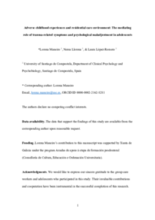Background:
research has consistently found poorer outcomes in adolescents who have been exposed to early interpersonal adversities, especially those in out-of-home placements. The presence of mental health problems also contributes to the perception of a more negative group climate and peer interactions through cascading effects.
Objective:
to analyze the sequential relationships between exposure to adverse childhood experiences (ACEs), trauma-related symptoms, psychological maladjustment, and the perception of group climate and peer interactions. In addition, the study analyzes the mediating role of trauma-related symptoms and psychological maladjustment.
Participants and Setting:
the sample comprised 161 adolescents in out-of-home care (46.6% males, 49.7% females, 3.7% non-binary), aged 12-18 (M = 15.22, SD = 1.59) from 25 residential facilities in Spain.
Methods:
this study is part of the VRINEP project. Group care workers reported about ACEs and trauma-related symptoms through online questionnaires, whereas adolescents self-reported about psychological maladjustment, group climate, and peer interactions. Results: differential associations between ACEs with trauma-related symptoms and internalizing problems were found. In addition, the relationship between certain ACEs and externalizing problems was fully mediated by trauma-related symptoms. Likewise, psychological maladjustment was related to a more negative perception of the group climate and peer interactions. Although trauma-related symptoms were not directly associated with the perception of the residential environment, they were indirectly associated with peer relational aggression through externalizing problems.
Conclusions:
Mental health has a significant impact on the perception of the group climate and peer interactions among adolescents in residential care who have been exposed to ACEs

